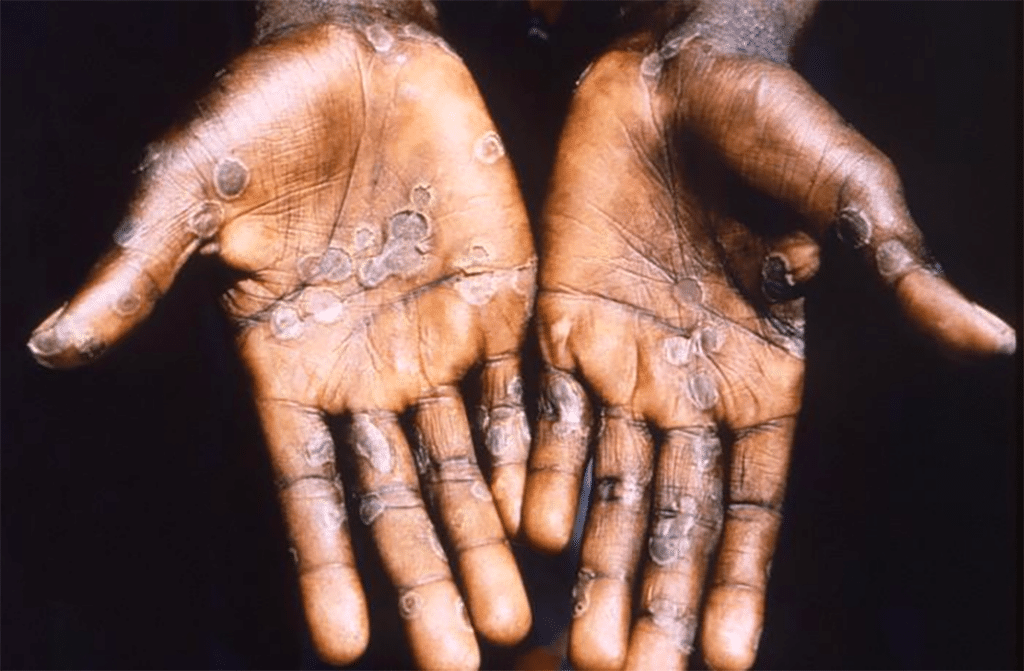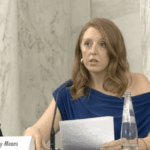How big of a deal is monkeypox?
By Matt Field | May 23, 2022
 A monkeypox patient's hands during a 1997 outbreak in the Democratic Republic of Congo. Credit: CDC/Brian W.J. Mahy.
A monkeypox patient's hands during a 1997 outbreak in the Democratic Republic of Congo. Credit: CDC/Brian W.J. Mahy.
A quick search for “monkeypox” on Google News is enough to give a person whiplash. More than two years into the COVID-19 pandemic, infectious diseases have a lot of people on edge, and many of the media’s headlines are definitely anxiety inducing. “There’s a Monkeypox Vaccine. But Not Everyone May Need It,” reads a headline in Time, practically begging people to wonder whether they need it. “Is Monkeypox Just the Beginning?” Rolling Stone asks. Other headlines frame the story differently. “Monkeypox likely isn’t much of a threat to the public, a White House official says,” reads an NPR headline.
President Joe Biden appeared to telegraph the dueling narratives, telling the press on Sunday that monkeypox “is something everybody should be concerned about.” Just a day later, Biden had a more reassuring message. “We have vaccines to take care of it,” the president said on a trip to Tokyo, according to CNN. “I just don’t think it rises to the level of the kind of concern that existed with COVID-19.”
The monkeypox virus is a cousin of the variola virus that causes smallpox, the disease that has sparked numerous deadly epidemics throughout human history. But smallpox—which has been eradicated, save for samples in labs in the United States and Russia—had a fatality rate of 30 percent. The strain of monkeypox turning up in Europe, the United States, and elsewhere is much milder and most people can recover at home in two to four weeks. Monkeypox is endemic in parts of West and Central Africa.
Since 1970, 11 African countries have reported monkeypox cases. A large outbreak began in Nigeria in 2017, leading to hundreds of confirmed and suspected cases, according to the World Health Organization (WHO).
Anne Rimoin, professor of epidemiology at the UCLA Fielding School of Public Health, told CBS that in areas with poor access to health care, monkeypox can be fatal in up to 3.5 percent of cases. In the United States, when 47 people caught the virus in 2003, nobody died.
Critically the virus causing worldwide alarm does not appear to spread easily, in contrast to SARS-CoV-2, the virus that causes COVID-19. Unlike COVID-19, monkeypox is thought to require prolonged or very close contact to spread, according to the CDC.
"COVID is spread by respiratory route and is highly infectious. This doesn't appear to be the case with the monkeypox," Martin Hirsch, a doctor at the Massachusetts General Hospital, told Reuters.
Between May 13 and May 21, according to the WHO, fewer than 100 cases of monkeypox were being reported in 12 countries. Despite the low number of cases, it’s unusual to see so many outbreaks in different places outside the African countries where the disease is endemic. “We do not usually see this level of apparently sustained spread in outbreaks occurring outside of endemic regions and not associated to travel or animal exposure,” Boghuma Titanji, an infectious diseases physician at Emory University, told The New York Times.
But there are medicines and vaccines that are effective against monkeypox. Moreover, given that the virus isn’t considered very infectious, while cases are likely to rise in the coming weeks, the virus won’t cause another COVID-19-style pandemic, experts say.
Perhaps the BBC best asked the question likely on many people’s minds in one of that network’s recent monkeypox headlines: “Monkeypox: Time to worry or one to ignore?”
Together, we make the world safer.
The Bulletin elevates expert voices above the noise. But as an independent nonprofit organization, our operations depend on the support of readers like you. Help us continue to deliver quality journalism that holds leaders accountable. Your support of our work at any level is important. In return, we promise our coverage will be understandable, influential, vigilant, solution-oriented, and fair-minded. Together we can make a difference.
Keywords: COVID-19, monkeypox
Topics: Biosecurity
















Perhaps the BBC best asked the question likely on many people’s minds in one of that network’s recent monkeypox headlines: “Monkeypox: Time to worry or one to ignore?”